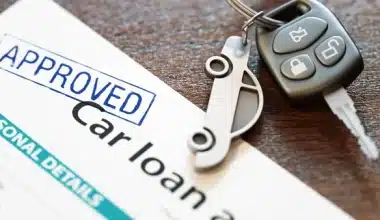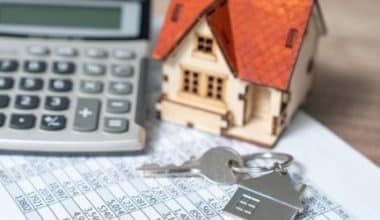Interest on a home loan is a cost that must be borne when financing a property purchase. The interest rate you pay will be depending on your individual financial position, as determined by your lender. Your interest rate will likely be low if you have excellent credit, a high income, and few loans. However, if your financial situation is less than optimal, you may be subject to a higher rate. Fortunately, you can negotiate a reduced interest rate with the lender before finalizing the deal. By paying mortgage points up front, borrowers can secure a lower interest rate and reduce their monthly payments. In this article, we will discuss mortgage points with credits, taxes, and how they work.
What Are Mortgage Points?
Mortgage points are up-front costs that a buyer of a property can pay in exchange for a somewhat more favorable interest rate.
A discount point is equal to one percent of the loan amount. One point, for instance, would set you back $1,000 on a loan of $100,000. Points lower your monthly principal and interest payment by prepaying interest. Your lender will add any points you buy to the closing cost.
You can lower your interest rate by a predetermined amount for every discount point you purchase. If you buy one point from a lender, you can expect a quarter of a percentage point off your interest rate. The quantity of points you can purchase on a mortgage is often capped. In most cases, you can buy points in 0.125% (or even smaller) increments.
Take a $200,000 30-year fixed-rate mortgage at 5.125%, for instance. If you pay the lender 1.75 mortgage points upfront, they will lower your interest rate to 4.75%. Each point on a $200,000 loan costs $2,000, therefore the total cost of 1.75 points would be $3,500.
The interest rate on your mortgage will stay at 5.125% if you don’t pay for the discount points. Without making any principal or interest payments, the loan costs $391,809.
However, if you want to take advantage of the reduction of 1.75 points, your total interest payments will amount to $375,586. If you had a 30-year mortgage, paying points would have saved you $16,223.
The use of discount points for an ARM mortgage loan is analogous to that of a fixed-rate mortgage loan. Calculate how long buying points will be profitable since your loan will change after 5 or 7 years.
How Do Mortgage Points Work?
One mortgage discount point is equal to a 0.25 percentage point reduction in your interest rate over the life of the loan, so paying one point would reduce a mortgage rate from 4 percent to 3.75 percent. The amount by which each point reduces the rate varies from lender to lender. The ability of mortgage points to lower rates is partly contingent on the nature of the mortgage loan and the prevailing interest rate climate. Details on purchasing points should be provided by mortgage lenders when being considered.
Also, borrowers can purchase a whole number of points or a specific number of fractional points. If you have a $300,000 mortgage and you wanted to cut your interest rate by 0.125 percentage points, you’d have to pay $1,500 (half a point).
Both the loan estimate (received after a mortgage application) and the closing disclosure (received prior to the closing of the loan) will detail the points that will need to be paid at closing.
Are Mortgage Points Worth It?
Discount point payments may be invested to generate a higher return than the amount saved by paying for the points, but the average homeowner’s fear of getting into a mortgage they can’t afford outweighs the potential benefit they may accrue if they manage to select the right investment. Paying off the mortgage is often a higher priority.
It’s important to remember why you want to buy a house. Although most homebuyers anticipate an increase in value, few actually buy a house with the intention of using it as an investment. Even if the value of your property triples, you might not want to sell it for the very practical reason that you would then have to find a new place to live, negating the investment value of the increase.
Your neighborhood’s home prices are likely to rise along with yours if the housing market improves. If that’s the case, the money you’d get from selling your house wouldn’t be enough to buy another one of roughly the same value. Additionally, if you take the full 30 years to pay off your mortgage, you will likely have paid roughly quadruple the initial selling price in main and interest payments, so you won’t make much of a real profit if you sell at the higher price.
Should You Refinance to Lower Your Interest Rate?
Purchasing mortgage points allows borrowers to reduce their interest rate and monthly payment by making an upfront contribution. In specific situations, it’s the most rational option:
#1. If You Anticipate Spending a Considerable Amount of Time There
Buying points lowers your interest rate for the duration of your mortgage, therefore the money you put into points will have a greater impact the longer you have the loan. Therefore, the monthly savings may justify the initial investment if you intend to stay in the house for an extended period of time. It will take a long time to recoup that initial investment. (Conversely, paying points is likely to cost you more money in the long run if you don’t intend to keep your home for an extended period of time.)
#2. You’ve Already Made a Significant Down Payment of 20%
If so, you’re probably getting the lowest possible interest rate from your lender and avoiding private mortgage insurance (PMI). However, if you haven’t saved up 20% for the down payment yet, you may get an even bigger rate reduction by putting that money toward the down payment instead of buying points. This is due to the fact that a smaller mortgage in relation to the home’s value (your loan-to-value ratio, or LTV) results from a larger down payment.
#3. You Are Not Planning a Refinancing in the Near Future
The current climate of relatively high-interest rates may cause you to contemplate a refinance in the future, even if you want to remain in the house for a while. If you’re planning on refinancing in the near future, you might want to hold off on buying mortgage points until after the refinancing process is complete.
In addition, borrowers should calculate how long it would take them to break even if they purchased mortgage points, taking into account the size and location of the property, the borrower’s employment situation, and the current mortgage rate environment.
Can You Negotiate Points on a Mortgage?
In principle, both discount points and origination points can be negotiated when applying for a loan. But in reality, that’s not always the situation. After loan approval, your loan officer is the only person who can give you definitive answers.
One of the easiest ways to successfully negotiate discounts or origination points is to apply for a mortgage from a number of different lenders. Once you have loan offers in hand, you can shop about and see if you can receive better terms from different lenders.
You may rest assured that this will not have a negative impact on your credit score because credit bureaus view credit checks performed by different mortgage lenders within the same 30-day time frame as a single credit check. Since you obviously want to save money, they presume you’re comparing prices. Also, read MORTGAGE INVESTMENT PROPERTY: Rates, Requirements, How to Get It & Best Mortgage Properties
What Are the Benefits of Paying Mortgage Points?
Ideally, you would pay mortgage points to reduce your interest rate and save money over the life of your loan. Advantages of mortgage points include:
#1. Budgeting Wisely
This is the primary advantage of buying mortgage points. Mortgage points are an up-front expense that can add thousands to the total cost of buying a home, but they could be well worth it if you plan to stay in the house for a long enough period of time to recoup your money through the reduced interest rate.
It has been demonstrated that saving tens of thousands of dollars over the loan’s lifetime can be achieved by paying a few thousand dollars more upfront. However, you may not save money by paying for points if you intend to refinance or sell your property before the break-even point.
#2. Spend Less Money on Your Taxes
Keep in mind that the interest you pay on your mortgage is deductible from your taxes. Because mortgage points are essentially pre-paid interest on the mortgage, it is quite likely that you will be able to deduct the cost of those mortgage points from your taxable income. However, before making any assumptions about this benefit, it is vital to evaluate your situation with a certified tax expert. Only then should you move on to the next step.
#3. A Potentially Reduced Monthly Payment
You may also be able to reduce your monthly price by using points. Because mortgage points assist you lower your interest rate, the amount of interest that you have to pay on a monthly basis will be smaller as a result. Your regular payment will be lower in proportion to the amount of interest that you pay each month.
Should I Buy Points on a Mortgage?
If you have the cash on hand and are interested in saving money over the course of the loan’s term, paying points may be a good option. If you don’t have much money for a down payment but still want to save money on interest, you could look into purchasing lender credits.
However, it may not be wise to pay points or accept a higher interest rate in exchange for lender credits if you are unsure of how long you will be staying in the home.
To determine which option is best for you, your loan officer can show you the total expenditures under several alternative situations, both with and without points or credits.
When To Buy Mortgage Points
Purchasing mortgage points could be a good idea if you fall into any of the following categories:
- You hope to spend many more years at your current residence. Points and a lower mortgage rate are a good investment if you want to keep your house for a long time. Mortgage points can help you save money if you plan to keep your current mortgage for the long run. You can save more money with discount points the longer you keep the same loan.
- You’ve calculated when things will be profitable again. Estimate how long it will take for the monthly savings from your mortgage to outweigh the one-time cost of the points. Buying points is a good idea if you are confident that you will not move or refinance before you reach the breakeven threshold.
When Not To Buy Mortgage Points
Not all homebuyers should pay mortgage points. Reasons why you shouldn’t buy them are as follows:
- You aren’t setting up permanent residence at the moment. There isn’t much use in getting a discount if you’re the type of person who likes to uproot every few years. Paying less interest over time can be accomplished using points as a long-term approach. The interest savings will outweigh the cost of the points purchase once some time has passed. The value of points decreases if you anticipate a move in the near future.
- You intend to make a lump sum payment toward your mortgage. Points on a mortgage are worthwhile investments only if you plan to keep making payments for a long time. It’s possible that you won’t save much money if you have the capacity to pay off your debt soon.
- Your initial investment would be harmed. In most cases, a larger down payment is preferable to paying for discount points. Lower interest rates, lower mortgage insurance premiums (or no premiums at all), and lower monthly payments are all possible results of a bigger down payment. None of these perks are included with mortgage discount points.
- Insufficient funds prevent you from purchasing points. There is no point in draining your funds to save on interest payments in the future. Instead, you can save money on interest over time by paying extra toward your principal whenever you can. Also, read LOW DOWN PAYMENT MORTGAGE: How to Get It and the Best Loan
- You hope to undergo a refinance soon. Mortgage point purchases might be tempting when interest rates are high. However, if you refinance your mortgage soon, you will pay origination and discount points again. This will result in you having to pay twice for the same services.
What Are Mortgage Points and Credits?
You can negotiate the mortgage and closing expenses by using points and lender credits. Paying an up-front cost in the form of points (sometimes called discount points) reduces your interest rate. If you’re willing to accept a higher interest rate from the lender, they may offer you a credit toward your closing costs.
There is some wiggle room in the definitions of these phrases. The term “points” has been in use by mortgage lenders for decades. It’s possible that your lender will use the term “points” to refer to an up-front fee equal to a certain percentage of your loan amount, regardless of whether or not the fee results in a lower interest rate. Lender credits are a form of compensation offered by some lenders that are not tied to the interest rate you are charged.
How Are Mortgage Points and Credits Calculated?
One point is equal to one percent of the loan’s principal balance.
Credits are also determined as a proportion of the overall loan amount. Incentives to reduce mortgage points or raise credits (depending on the option you’ve selected) may be made available by the lender at their discretion due to various factors such as promotional offers, etc.
Lenders’ individual pricing structures explain why otherwise identical interest rates might be found at widely varying interest rates from one institution to the next.
When you check your custom rate options in your Better Mortgage account, all points and credits are shown in their actual dollar amounts in the interest of full disclosure. Points (more money due at closing) and lender credits (less money due at closing) are represented by positive and negative numbers in the points/credits column, respectively.
How to Choose Between Mortgage Points or Credits
The best course of action, as is the case with many other mortgage-related considerations, will vary from person to person. That relies on your answer to one of the first questions your mortgage professional will ask you:
“What is your expected holding period for the property you are buying or refinancing?”
There is a break-even point at the center of this dilemma, as there are many financial decisions. Within the next six years, the majority of Americans will either sell, refinance, or close.
How long you anticipate maintaining the loan can affect your decision between credits and points. Credits may be preferable if you’re like the majority of Americans and don’t intend to maintain the loan for a very long period. Any future cost reductions will be outweighed by the initial investment. It could be more cost-effective to pay points if you plan to keep the loan for a longer duration. While you’ll have a bigger payment each month, the money you save in the long run will be worth paying the higher interest rate now.
The lowest rate option that does not include points is the “par rate,” which is an option you can select. This option may be the most practical if you can’t commit to anything else right now.
Time is important, but how much money you can spare in advance is as important to consider. Keep in mind that while credits can reduce your closing costs, mortgage points can increase them.
What Is the Difference Between Points and Origination Fees?
In the world of mortgage loans, there are two types of “points”: discount points and origination points. These “points,” while they may sound the same, have quite different meanings. You should know the difference between these two phrases that lenders use at closing and what it means for your closing expenses and your monthly mortgage payment before signing on the dotted line.
The monthly payment on a mortgage can be reduced by paying discount points upfront to “buy down” the interest rate. One discount point typically results in a 0.25% point reduction in the fixed interest rate on a mortgage. If you itemize your deductions and pay a lot in taxes, discount points may be tax deductible like mortgage interest. (Since tax regulations are subject to change, it’s important to consult a tax professional before purchasing discount points.)
In contrast, origination points are paid to cover the fees and expenses of processing the loan application. There are several factors that can change these costs. Some mortgage lenders charge points for the origination of a loan, while others have a flat rate. The origination point range for a home mortgage is 0.50% to 1.50%, with 1.00% being the norm. The point of origin is not eligible for a tax deduction.
Mortgage Point Taxes
If you meet the requirements, you may be able to deduct the entire amount of mortgage points you paid that year from your taxes. In any case, mortgage points may be paid over the course of the loan.
Mortgage points increase the total cost of the mortgage loan up front, but the resulting lower interest rate often results in greater savings on a monthly basis. It’s comforting to know that some of the various costs associated with purchasing a home, such as mortgage points, are deductible.
But there are several things you need to know before you try to write off mortgage points on your taxes. So, in a mobile app for house and auto insurance, Jerry will give you the lowdown on mortgage points and how they relate to tax deductions.
Are Mortgage Points Tax Deductible?
Under some circumstances, taxpayers will be able to deduct points paid on a mortgage as interest. Your tax bill or refund could be affected by the amount of deductions you claim this year.
Points might be written off in the year they were paid or spread out over the life of the loan. The IRS has established the following guidelines that must be followed in order to claim a deduction for points paid in a given year:
- Your primary residence serves as collateral for the loan.
- Points payments must be standard procedure in the market where the loan originated.
- Payment in points is fair in light of the going rate in the market.
- When filing your taxes, you use the cash method of accounting, which requires you to record income in the year it occurs and deduct costs in the year they are paid.
- You won’t get any points off of things like the appraisal, the inspection, or the title search.
- You didn’t take out a loan to cover the cost of points paid to the mortgage broker.
- Your primary residence, whether already existing or yet-to-be-built, is the purpose of the loan.
If you refinance your mortgage and meet the first six conditions listed above, you may be eligible to deduct the points you pay in the same year you pay them. However, the points you pay on a home equity loan closed after December 15, 2017, cannot be deducted. The tax year 2025 is the last that falls under this exemption.
How to Deduct Mortgage Points on Your Taxes
Once you’ve verified that you’re eligible for a tax deduction and have paid mortgage points, deducting them is simple. When filing your taxes, simply enter the pertinent information from your Form 1098 into Schedule A of the IRS Form 1040. If you file your taxes electronically, the software you use may request this data automatically.
Your mortgage lender should send you a Form 1098 that includes important information about your loan, such as:
- Quantity of Mortgage Still Due
- Annual mortgage interest payments
- Interest refund for overpayments
- Repayment of Mortgage Insurance Premiums
- Paying the lender a point premium.
You may find the money amount associated with your points in Box 6 of Form 1098. You can request a copy of Form 1098 from your lender if you did not receive one. Your points payment can also be seen on your mortgage settlement statement.
Remember that you will no longer be able to deduct mortgage points from your taxes if you pay off your mortgage early. However, if you meet the IRS’s requirements, you can deduct them in the same year that you pay them.
Conclusion
Buying points is a great strategy to reduce your mortgage interest rate. Just keep in mind that it will take five years or more before they pay for themselves. Paying points is worthwhile only if you want to keep the loan for a prolonged period of time.
Points may be a decent option if you expect to set your mortgage and forget it, but they may not be worth it if you plan to actively manage your account and refinance into a lower rate if the market declines.
Mortgage Points FAQs
What are origination points also known as?
An origination fee (sometimes known as an origination “point”) is a price paid to a lender in order for them to process a loan application. The borrower agrees to pay the lender this upfront charge to set up the loan or mortgage.
What are negative points on a mortgage?
The opposite of a lender credit is a negative point. Credits function similarly to mortgage points but in the opposite direction. The lender charges you a higher interest rate in exchange for helping you pay for your mortgage’s closing costs. A higher interest rate means a lower initial payment but a greater total obligation.
How much are 25 points on a mortgage?
Points are a percentage of the loan amount; hence, 25 points are equivalent to 25% of the loan amount.
Similar Articles
- BLANKET MORTGAGE: Meaning, How It Works, Benefits & Who Should Use It
- WHAT IS A TITLE LOAN: Requirements, Company, Car & Rates
- MORTGAGE LOAN: What Does Mortgage Loan Mean, Rate, Officers, Calculation & Salary
- LEASE OFFICE: Office Space for Lease or Rent 2023






